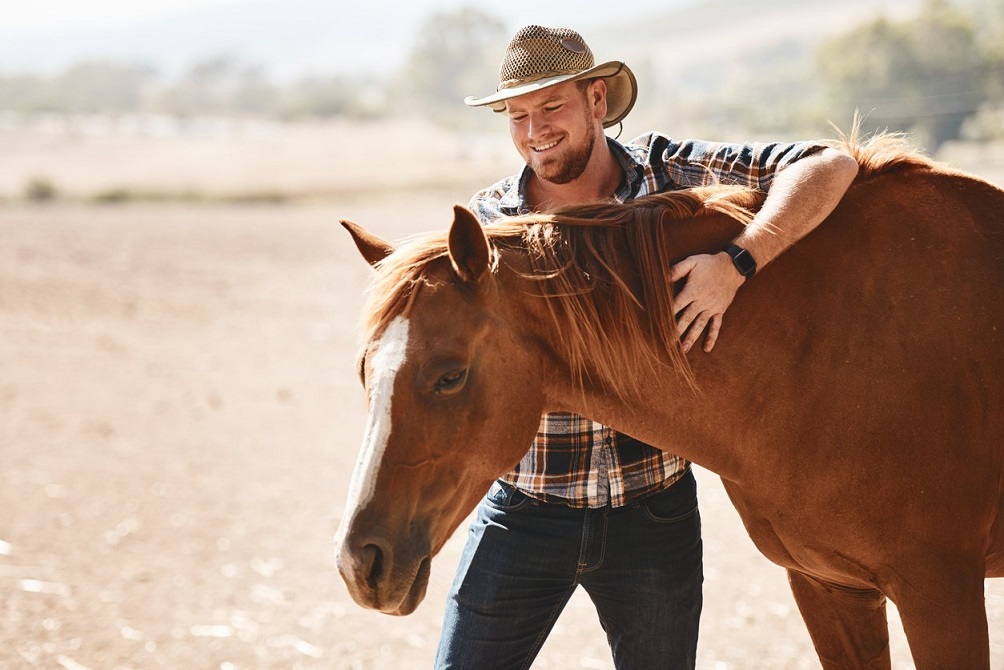For the most part, hyaluronic acid supplements are considered to be safe for horses. As with any supplement, however, you should pay attention to your horse’s behaviour and health when administering HA. Some horses have allergies that may cause problems.
Injection sites should also be carefully monitored for signs of infection if hyaluronic acid is given intra-articular or intravenously.
It’s also critical to note that hyaluronic acid is not a substitute for proper veterinary care. If your horse exhibits signs of lameness or pain, contact your veterinarian for appropriate diagnosis and treatment.
When used correctly, hyaluronic acid is a safe and effective supplement for horses needing an extra boost of joint and cartilage health.
FAQS About Hyaluronic Acid
We know horse owners want the very best for their equine partners and may have questions about hyaluronic acid.
Here are some common FAQs that may help.
Is Hyaluronic Acid Good for Ulcers?
Hyaluronic acid may be good for ulcers in some cases. For example, HA may reduce the pain and inflammation associated with ulcers. It’s also good for speeding the healing process of skin ulcers.
A holistic pre & probiotic supplement that promotes good digestion and a robust immune system, like in-sideout, is another great option for ulcer prevention and support.
Are There Any Natural Sources of Hyaluronic Acid?
Hyaluronic acid is naturally found in some foods, such as bone broth, soy products, eggs and vegetables. However, these sources may not provide enough of the acid to be beneficial, and equines typically don’t partake in these foods anyway.
To get the best results, oral supplementations or injections are often necessary for horses, humans and other animals.
Will Hyaluronic Acid Help My Horse’s Arthritis?
Hyaluronic acid is commonly used as a joint supplement and can help decrease inflammation and pain associated with arthritis. As such, it may help your horse’s arthritic joints tremendously.
HA injections are often recommended for horses suffering from joint issues, as the supplement is concentrated and can be administered directly to the joint. However, oral supplements are also an option.
What Other Supplements Does My Horse Need?
The goal with nutriceutical and dietary supplements is usually to support your horse holistically, encouraging full-body health instead of focusing only on problem areas.
To achieve that goal, hyaluronic acid is often combined with other joint health products, such as glucosamine and chondroitin sulphate, to create more effective supplements. Omega-3 fatty acids are also beneficial for joint health.
Other helpful horse supplements include:
MSM Supplements
MSM supplements, like in-fusion MSM, may pair well with hyaluronic acid. MSM is known to reduce inflammation, encourage a healthy metabolism and repair damaged tissue. It also contributes to strong hooves, skin and hair.
When combined with HA, MSM supplements may provide significant benefits to your horse’s health.
Pre & Probiotic Supplements
Holistic supplements that encourage good gut health and immune support, like in-sideout, can also help maximise hyaluronic acid’s benefits and facilitate optimal overall health.
in-sideout offers equines many advantages, including skin and coat health, better utilisation of nutrients and ulcer prevention.
Hoof and Coat Supplements
Having healthy skin and hooves is vital to infection prevention. Horse owners treating animals with hoof or skin issues should consider supplements like in-stride, which encourages growth and stronger hooves.
It’s best to discuss supplement combinations with a veterinarian or nutritionist. They can help you decide which supplements work best for your horse’s specific situation.
Healthier Joints and a Happier Horse
So, what does hyaluronic acid do for horses? A lot! HA supplementation support horses with joint problems in maintaining a comfortable lifestyle and can aid racehorses and other competitive animals in achieving peak performance. The anti-inflammatory properties of HA may even alleviate swelling and discomfort caused by issues like laminitis.
Hyaluronic acid is a safe and effective supplement to improve your horse’s joints and overall health. Just make sure to consult your veterinarian before administering any new supplement and follow their directions closely.
With the right care, your horse can enjoy healthier joints and a happier life.
